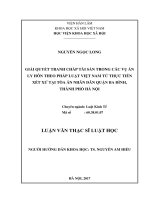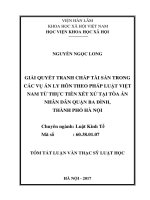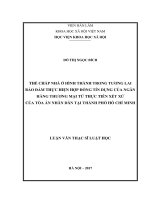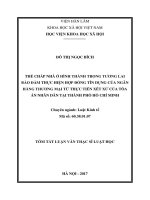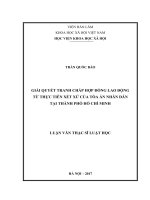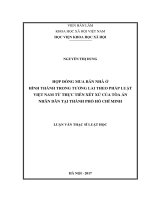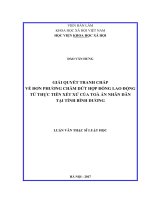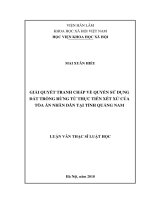Giải quyết tranh chấp về đơn phương chấm dứt hợp đồng lao động theo pháp luật việt nam từ thực tiễn xét xử của tòa án nhân dân tại thành phố hồ chí minh tt tiếng anh
Bạn đang xem bản rút gọn của tài liệu. Xem và tải ngay bản đầy đủ của tài liệu tại đây (270.21 KB, 27 trang )
VIETNAM ACADEMY OF SOCIAL SCIENCES
GRADUATE ACADEMY OF SOCIAL SCIENCES
L
PHAM THI THU PHUONG
SOLVING DISPUTES ON UNILATERALLY
TERMINATING LABOUR CONTRACTS UNDER THE
VIETNAMESE LAW: A CASE STUDY OF THE PEOPLE’S
COURT IN HO CHI MINH CITY
Major: Economic Law
Major code: 9.38.01.07
SUMMARY OF THE DOCTORAL DISSERTATION IN LAW
Hanoi - 2019
The dissertation completed at Graduate Academy of Social Sciences,
Vietnam Academy of Social Sciences
Supervisor: Assoc. Prof. Dr. Bui Anh Thuy
Reviewer 1: Prof. Dr. Le Hong Hanh
Reviewer 2: Assoc. Prof. Dr. Le Thi Chau
Reviewer 3: Dr. Bui Ngoc Cuong
The dissertation will be defended at Graduate Academy Level Council of
dissertation assessment at Graduate Academy of Social Sciences, Vietnam
Academy of Social Sciences, 477 Nguyen Trai, Thanh Xuan, Hanoi.
Time: ………… date ………. month …… …year 2019
The dissertation may be found at:
- Vietnam National Library;
- Graduate Academy of Social Sciences Library
INTRODUCTION
1. The necessity of the research topic
Ho Chi Minh City (HCMC) is a key area of the economic
development of the Southeast region, the service center of Southeast
Asia with the largest number of businesses and employees in Vietnam.
According to the Center for Human Resource Forecast and Labor
Market Information of HCMC, by 2020, HCMC needs 320,000 jobs,
including 130,000 new ones. However, along with the above
development, labour cases in HCMC are therefore always large in
number and complicated in content.
In fact, the two-tier People’s Court in HCMC still faces many
difficulties and obstacles in the practice of judging these cases, so the
effectiveness of the trial has not been achieved as expected.
One of the reasons for the above situation is that unilateral
termination of labor contracts to be a complicated dispute. The
provisions of the Labor Code 2012 (which took effect since May 1,
2013) have greatly contributed to the adjustment of labour relations but
still have some inadequacies while the complexity of unilateral
termination of labor contracts tends to increase. The inconsistency in
solving disputes and assessing evidence among proceeding-conducting
persons leading to different consequences, judgment annulling or
judgment correction due to procedural violations.
From reasons mentioned above, it is necessary to examine and assess
provisions of Vietnamese existing law, and to selectively acquire the
advances of international law and of countries around the world so as to
provide solutions to improve Vietnamese law. Therefore, the author has
chosen research work titled “Solving disputes on unilaterally
1
terminating labour contracts under the Vietnamese law: A case study of
the People’s Court in HCMC” as her doctoral dissertation in law.
2. Research purpose and tasks
The dissertation aims to clarify the theoretical and practical issues on
unilaterally and solving disputes on unilaterally terminating labour
contracts of the two-tier People’s Court in HCMC so as to propose
solutions to improve the law on unilaterally and unilateral dispute
settlement to terminate the labour contracts.
3. Research subject and scope
3.1. Research subject
First, provisions of labour law of Vietnam on contents (basis,
procedures and legal consequences) of unilaterally terminating labour
contracts and civil procedures to solve disputes of unilateral termination
of labour contracts of the People’s Court.
Second, the practice of solving disputes on unilaterally terminating
labour contracts of the two-tier People’s Court in HCMC.
3.2. Research scope
The study just examines the law on unilaterally terminating labour
contracts (basis, procedures and legal consequences) and solving
disputes on unilaterally terminating labour contracts at the People’s
Court. The assessment of the law enforcement on solving these disputes
is conducted in HCMC (first-instance and appellate trials of the two-tier
People’s Courts in HCMC (district and provincial levels) in accordance
with civil proceedings).
The
dissertation
just
considers
regulations
on
unilaterally
terminating labour contracts of employers who are Vietnamese
individuals and legal entities (not studying cases that employers are
2
foreigner individuals or legal entities who conduct labour contracts
under foreign law but working in Vietnam).
4. Methodology and research methods
4.1. Methodology
The study utilizes methodology of Marxism-Leninism on dialectical
and historical materialism, Ho Chi Minh thought and viewpoints of the
Communist Party of Vietnam.
4.2. Research methods
The dissertation utilizes a combination of research methods
including methods of analysis, statistics, systematization, interpretation
and comparison.
5. New contributions of the dissertation
This is the first, comprehensive and systematical research work on the
theoretical and legal issues on unilateral and solving disputes on
unilaterally terminating labour contracts, namely:
First, the dissertation continues to improve and develop theoretical
basis of the law on solving disputes on unilaterally terminating labour
contracts at the People’s Court.
Second, the dissertation seeks to assess comprehensively and
systematically the reality of the law and practice of applying Vietnam’s
existing law on solving unilateral termination of labour contracts at the
People’s Court so as to point out problems and shortcomings of the
existing law.
Third,
the
dissertation
provides
specific
directions
and
recommendations to improve Vietnam’s existing law on solving disputes
on unilaterally terminating labour contracts at the People’s Court from the
trial experience of a two-tier People’s Court system in Ho Chi Minh City.
3
6. Theoretical and practical significance of the dissertation
Theoretically: the dissertation contributes to strengthening and
improving the theoretical basis on unilaterally and solving disputes on
unilaterally terminating labour contracts under the Vietnamese law.
Practically: the dissertation contributes to further improving the
efficiency of implementing unilateral termination of labour contracts by
parties in labour relations as well as the efficiency of solving disputes
on unilaterally terminating labour contracts and labour management of
the state administration.
7. Structure of the dissertation
Besides the introduction and conclusion and references, the
dissertation includes 4 chapters:
Chapter 1: Literature review and theoretical basis
Chapter 2: Theoretical issues of unilateral termination of labour
contracts and solving disputes on unilaterally terminating labour
contracts at the People’s Court
Chapter 3: The reality of the law and applying the law for solving
disputes on unilaterally terminating labour contracts by the People’s
Court in Ho Chi Minh City
Chapter 4: Improving the law of solving disputes on unilaterally
terminating labour contracts at the People’s Court
4
Chapter 1
LITERATURE REVIEW AND THEORETICAL BASIS
1.1. Literature review
1.1.1. Research situation in Vietnam
In Vietnam, solving disputes on unilaterally terminating labour
contracts is not a new topic and has long attracted many authors to
study with different scales and levels. For example, the concept of
unilaterally terminating labour contracts, basis for terminating
unilaterally labour contracts, order, procedures, legal consequences, as
well as procedures of solving disputes on unilaterally terminating labour
contracts and solutions to improve the law on solving disputes on
unilaterally terminating labour contracts.
Studies on unilaterally terminating labour contracts argued that
Vietnamese labour law has many limitations and thus provides
orientations to improve the law’s contents such as perfecting the general
orientation of the labour law specific regulations on labour procedures
and complete specific provisions in the Labor Code.
1.1.2. Research situation abroad
In other countries, the issue of solving disputes on unilaterally
terminating labour contracts has also been examined in different aspects
and levels such as A.C.L Davies published the book “Perspectives on
Labour law” in 2003; “The Future of Labour law” by Catherine
Barnard, Simon Deakin and Gillians Morris, Oxford and Portland
Oregon in 2004, especially John D. R. Craig và S. Michael Lynk
published the book “Globalization and the future of labour law” in
2006.
5
1.2.3. General assessment
First, many research works have clarified some theoretical issues on
the concept and characteristics of the law on unilaterally and solving
disputes on unilaterally terminating labour contracts but there are
theoretically gaps of the law adjustment to this issue.
Second, research works on the practice of applying the law on
unilateral termination of labour contracts (applying basis, order,
procedures, legal consequences) are greatly interested in while applying
the law for solving disputes on unilaterally terminating labour contracts
at the People’s Court (jurisdiction, statute of limitations, order and
procedures) are still very limited.
Third, solutions to improve the law on unilaterally and solving
disputes on unilaterally terminating labour contracts, some research
works have made specific recommendations based on the analysis of
situation of the law as well as the application in practice.
1.1.4. The issues need to be further examined in the dissertation
First, the dissertation seeks to examine theoretical issues of solving
disputes on unilaterally terminating labour contracts such as concepts,
characteristics, significance and contents of legal adjustment on
unilaterally and solving disputes on unilaterally terminating labour
contracts.
Second, from the practice of solving disputes on unilaterally
terminating labour contracts in HCMC, the dissertation tries to assess
the efficiency of adjustment of the existing Civil Procedure Code when
solving disputes and is it necessary to enact a separate law to regulate
this type of dispute?
Third, the dissertation summarizes the lessons learned from the
practice of trial so as to provide specific solutions to improve the
6
efficiency of solving these cases in the context of international
economic integration of Vietnam.
1.2. The theoretical basis
First, Marxism - Leninism, Ho Chi Minh thought on the role of the
State, the relationship between state power and the protection of
citizens’ democratic freedoms (rights of disputing parties), between law
and economy, between the common and the private, between social
consciousness and social existence, and business freedom.
Second, policies and guidelines of the Communist Party of Vietnam
and the laws of the State of the Socialist Republic of Vietnam.
Third, the theory of equality before the law.
Fourth, the theory of the rights to access to justice of citizens and the
role of the court in solving disputes on unilaterally terminating labour
contracts.
Fifth, the theory of respecting for the rights to self-determination of
parties in the labour relations, from the conclusion of the labour contract
to the termination of the labour contract and solving disputes.
Sixth, the theory of limiting freedom of parties in labour relations.
1.2.1. Research questions, research hypotheses and research
findings
Q1: What are characteristics of unilateral termination of the labour
contracts and the requirements for solving disputes on unilaterally
terminating labour contracts in general and solving disputes in the
People’s Court in particular?
Q2: What is the role of solving disputes on unilaterally terminating
labour contracts for production stability, social stability and economic
development?
7
Q3: What are the contents of the law on unilateral termination of the
labour contract and solving disputes on unilaterally terminating labour
contracts?
Q4: What are inadequacies of provisions of the law on solving
disputes on unilaterally terminating labour contracts and the law
enforcement in HCMC? What are the causes of such inadequacies?
Q5: What are directions and requirements for improving the law on
solving disputes on unilaterally terminating labour contracts?
Q6: Is it necessary to have recommendations to improve the law and
which solutions to implement the law on solving disputes on
unilaterally terminating labour contracts at the People’s Court from
experiences of two-tier People’s Court in HCMC?
1.2.2. Research approach
The dissertation is approached by the perspective of jurisprudence
and the real perspective (contents of the law and procedural law).
Conclusion of chapter 1
By reviewing literature and relevant issues, it may be seen that
solving disputes on unilaterally terminating labour contracts is not a
new topic and has long attracted many authors to examine with various
scope and levels. However, reviewing and assessing Vietnamese law on
this issue from the practice of the trial of the People’s Court, this is a
new and unexplored topic.
8
Chapter 2
THEORETICAL ISSUES OF UNILATERAL TERMINATION OF
LABOUR CONTRACTS AND SOLVING DISPUTES ON
UNILATERALLY TERMINATING LABOUR CONTRACTS AT
THE PEOPLE’S COURT
2.1. Theoretical issues of the law on unilateral termination of
labour contracts
2.1.1. The concept of unilateral termination of a labour contract
According to Article 15 of the 2012 Labour Code, a labour contract
is an agreement between the employee and the employer on paid
employment, working conditions, rights and obligations of each party in
the labour relationship.
The unilateral termination of a labor contract is essentially an act of
expressing the will of a subject who does not want to continue
performing the labor contract, can terminate the rights and obligations
of the parties under the labour contract ahead of time without depending
on the will of another party.
2.1.2. Characteristics of unilateral termination of a labour contract
Unilateral termination of a labour contract is the right of the subject
in the labour relationship; the unilateral termination of the labour
contract is the act stemming from the will of one party; this act may
terminate the legal validity of the labour contract ahead of time or
before the work is completed under the labour contract; the unilateral
termination of the labour contract has diverse legal consequences.
2.1.3. Significance of unilateral termination of a labour contract
For employers, this right contributes to eliminating the negative
aspects in the process of using employees, creating opportunities for
employers to recruit human resources in accordance with their needs.
9
For employees, this right creates opportunities for them to find
another job and employers are more suitable for them, and help them to
implement labour freedom.
For the State, when adjusting the unilateral termination of the labour
contract, the law protects and directs the development of these relations
by the state’s subjective will, creating a legal framework to limit
negative influence of unilateral termination of the labor contract in
terms of economy and society.
2.1.4. The adjusted contents of the law on unilaterally terminating
labour contracts
2.1.4.1. The basis for unilateral termination of labour contracts
The basis for unilateral termination of labour contract by employees
including working conditions are not consistent with labour contract
(job arrangement, location and working condition); Employees are not
paid fully salary and on time; although employees are legally depended
on employer, the employer has no right to mistreat or insult honor,
dignity or impose employees do work against their desire.
The basis for unilateral termination of labour contract by employer
including the cause of unilateral termination of labor contract comes
from employees; The cause of unilateral termination of labor contract
comes from employer; The cause of unilateral termination of labor
contract comes from objective reasons such natural disasters and fires.
2.1.4.2. Procedures of unilateral termination of labor contracts
When employees unilaterally terminate the labor contract, for
employers, in this time, can help them arranging or replacement of
personnel, as well as preparing expenses to pay for the employee (if
any).
10
When employers unilaterally terminate the labor contract, for
employees, in this time, can help them to find a new job suitable to their
abilities, avoiding the income disturbance affecting their lives and
family. The employer’s notice in advance must be reasonable (Article
11 of Convention 158). The law of countries has various provisions on
this issue.
2.1.4.3. Legal consequences of unilateral termination of labor
contract
The legal consequences arising from legally or illegally unilateral
termination of labour contracts are different. In the case of unilateral
termination of the labor contract in accordance with the law, the
settlement of the rights and obligations of the parties is quick and
convenient, there are few disputes and complaints. In contrast, unilateral
termination of labour contracts is illegal, it easily occurs disputes and
complaints.
2.2 Theoretical issues of the law on solving disputes on
unilaterally terminating labour contracts at the People’s Court
2.2.1 Concept and characteristics of unilateral dispute of
terminating labor contracts
2.2.1.1. The concept of unilateral dispute of terminating labour
contracts
Unilateral dispute of terminating labour contracts is defined as
conflicts between employees and employer when implementing the
right to unilaterally terminate the labour contracts. Unilateral dispute of
terminating labour contracts is essentially disputes of interests among
parties in the labour relations.
2.2.1.2. Characteristics of unilateral disputes of terminating labor
contracts
11
Unilateral dispute of terminating labor contracts is the dispute
among parties have interdependent relationship; unilateral dispute of
terminating labor contracts stemming from three main causes; unilateral
dispute of terminating labor contracts has many impacts on parties in
labour and social relationship.
2.2.2. Concept and characteristics of solving disputes on
unilaterally terminating labour contracts
2.2.2.1. The concept of solving disputes on unilaterally terminating
labour contracts
Solving disputes on unilaterally terminating labour contracts is
defined as competent state agencies carry out procedures to resolve
disputes on unilaterally terminating labour contracts to restore the
infringed rights and interests and resolving conflicts between employees
and employers to maintain stable production and labour relationship.
2.2.2.2. Characteristics of solving disputes on unilaterally
terminating labour contracts
First, solving disputes on unilaterally terminating labour contracts
must rely on the general principle of resolving labour disputes.
Second, solving disputes on unilaterally terminating labour contracts
can be implemented by many different ways.
Third, in the process of solving disputes on unilaterally terminating
labour contracts, there will be many stakeholders get involve in to
ensure that this resolution is implemented by order and procedures,
avoiding behaviors that may adversely affect parties in labour
relationship.
Fourth, solving disputes on unilaterally terminating labour contracts
in order to recognize or restore legitimate rights and interests of the
subjects.
12
2.2.3. Significance of solving disputes on unilaterally terminating
labour contracts
First, solving disputes on unilaterally terminating labour contracts
will have significant impacts on the stability of production, society and
economic development.
Second, solving disputes on unilaterally terminating labour contracts
will help employees, employers and the whole society believing the law
and creating stability of production, society and economic development.
2.2.4. Contents of the law on solving unilateral disputes of
terminating labour contracts at the People’s Court
2.2.4.1. Principles of solving disputes on unilaterally terminating
labour contracts at the People’s Court
Ensuring the right of decision and self-determination of the disputing
parties; ensuring equal rights among the disputing parties; providing
evidences; the mediation in solving disputes on unilaterally terminating
labour contracts; solving labor disputes publicly, transparently,
objectively, promptly, quickly and lawfully.
2.2.4.2. The jurisdiction of the People’s Court in solving disputes on
unilaterally terminating labour contracts
The jurisdiction of solving disputes on unilaterally terminating
labour contracts is an important issue of the law of solving disputes on
unilaterally terminating labour contracts in the People’s Court should be
examined.
2.2.4.3. Prescription to sue a case of unilaterally terminating labour
contract
It is necessary to pay attention to three contents: the time that
petitioner has the right to initiate a lawsuit; the time of the prescription
to sue, and the legal consequences of initiating a lawsuit late.
13
2.2.4.4 Order and procedure for solving disputes on unilaterally
terminating labour contracts at the People’s Court
Order and procedure for solving disputes on unilaterally terminating
labour contracts at the People’s Court with specific elements of judicial
jurisdiction, in which, the People’s Court plays a central role and has
the right to make the final decision to solve disputes. In order for this
order and procedure to be effective, the law on order and procedure for
solving disputes on unilaterally terminating labour contracts must be
built based on the characteristics of unilateral termination of labour
contracts and unilateral disputes of terminating labour contracts and
legal adjustments for this relationship.
Conclusion of chapter 2
Solving disputes on unilaterally terminating labour contracts is an
urgent demand to meet the requirements of objective practices. In
addition to the common characteristics of solving labour disputes,
solving disputes on unilaterally terminating labour contracts at the
People’s Court also has its own characteristics that make a difference
from other resolution of labour such as negotiation and mediation.
Therefore, the adjustment of the law of solving disputes on unilaterally
terminating labour contracts must consist of issues such as principles,
authority, order, procedure for solving disputes on unilaterally
terminating labour contracts at the People’s Court.
14
Chapter 3
THE REALITY OF THE LAW AND APPLYING THE LAW FOR
SOLVING DISPUTES ON UNILATERALLY TERMINATING
LABOUR CONTRACTS BY THE PEOPLE’S COURT IN
HO CHI MINH CITY
3.1. The reality of the law for solving disputes on unilaterally
terminating labour contracts at the People’s Court
3.1.1. The reality of labour law on unilateral termination of labour
contracts at the People’s Court
3.1.1.1. The basis for unilateral termination of labour contracts
* For employees: on the basis of types of labor contracts in Article
22 of the 2012 Labour Code, the law has had various adjustments on the
basis, order and procedures for unilateral termination of labour contracts
of employees.
* For employers: all three types of labour contracts, the employer
has the right to unilaterally terminate the labor contract when having
basis that stipulated in Article 38 of the 2012 Labor Code.
3.1.1.2. Procedures for unilateral termination of labour contracts
There is a difference of procedures for unilateral termination of
labour between employers and employees, between definite term labour
contracts, seasonal labour contracts and indefinite term contracts.
3.1.1.2. The legal consequences of unilateral termination of labor
contracts
The legal consequences of unilaterally terminating labour contracts
by the law are different from illegally unilateral termination of labour
contracts.
3.1.2. The real situation of civil procedure law of solving disputes
on unilaterally terminating labour contracts
15
The author analyzes the real situation in the following aspects:
Principles of solving disputes on unilaterally terminating labour
contracts at the People’s Court; the jurisdiction of solving disputes on
unilaterally terminating labour contracts; the prescription to sue cases of
unilateral termination of labour contracts; order and procedures for
solving disputes on unilaterally terminating labour contracts at the
People’s Court by the procedure of civil proceedings.
3.2. Practical application of the law for solving disputes on
unilaterally terminating labour contracts of the two-tier People’s
Court in HCMC
3.2.1 Overview of situation of solving disputes on unilaterally
terminating labour contracts of the two-tier People’s Court in HCMC
In fact, the number of labour dispute cases always accounts for a
significant proportion and with many difficulties and inadequacies in
solving this type of disputes.
The People’s Court in HCMC has jurisdiction to solve cases by firstinstance and appellate procedures.
3.2.2 Factors affecting unilateral dispute settlement of terminating
labour contracts of the two-tier People’s Court in HCMC
Solving disputes on unilaterally terminating labour contracts of the
two-tier People’s Court in HCMC is influenced by the following
factors: due to the characteristics of the socio-economic situation
affecting the employment situation in HCMC; number of officers and
judges of the People’s Court; the quality of people’s Jurors; conditions
on facilities, equipment, working facilities and application of
information technology; coordination between state agencies and the
Court.
16
3.2.3 Assessing practical application of the law for solving disputes
on unilaterally terminating labour contracts of the two-tier People’s
Court in HCMC
3.2.3.1. Assessing practical application of labour law
a. The basis for unilateral termination of labour contracts
* For employees: The author seeks to assess the actual basis on
employees are not arranged the right jobs, bad working conditions,
inconsistent with the agreement in the labour contract; employees are
mistreated, sexual abuse, force to work; employees are appointed doing
professional work in elected body or appointed holding job titles in the
state body.
* For employers: The author seeks to assess the actual basis on
employees often do not finish work under the labour contracts; on
changes of labor recruitment criteria when implementing labour
contracts; on the obligation to provide information to the employer
before committing the labour contract; agreements on restraint of
competition in the labour relationship; terminating labour contracts to
people who reach retirement age.
b. Procedures for unilateral termination of labour contracts
* For employees: The employee must continue to contact and is
managed and controlled by employer within next 3 working days to
terminate the labour contract, is not reasonable, thus it is necessary to
have specific instruction to apply consistently.
* For employers (they must notify in advance unilaterally
terminating labour contracts; on the order and procedures for employers
to unilaterally terminate the labour contract to juvenile employees; and
distinguishing the labour contracts from the service contracts and
collaborator contracts).
17
c. Legal consequences of unilateral termination of labor
contracts
In many cases, during the mediation and trial of labour disputes, the
social insurance agency requires the payment of social insurance by the
law, but the first-instance court just forces the employer to pay social
insurance and return the social insurance book to employees without
forcing the employees to pay social insurance is inconsistent, because
this is the obligation of both sides, this leads to appeals and protests.
3.2.3.2. Assessing practical application of the civil procedure law
In fact, the application of provisions of solving disputes on
unilaterally terminating labour contracts still has the following
problems: Principles of solving disputes on unilaterally terminating
labour contracts at the People’s contracts; the prescription to sue cases
of unilateral termination of labour contracts; order and procedures for
solving disputes on unilaterally terminating labour contracts at the
People’s Court by the procedure of civil proceedings.
Conclusion of chapter 3
General provisions of solving disputes on unilaterally terminating
labour contracts at the People’s Court such as principles of solving,
jurisdiction of the People’s Court, the prescription for solving labour
disputes on unilaterally terminating labour contracts at the People’s
Court have been discussed. Especially, procedures for solving labour
disputes on unilaterally terminating labour contracts at the People’s
Court are designed by the dissertation in an independent content
through the procedures for solving labour disputes on unilaterally
terminating labour contracts at the People’s Court.
18
Chapter 4
IMPROVING THE LAW OF SOLVING DISPUTES ON
UNILATERALLY TERMINATING LABOUR CONTRACTS
AT THE PEOPLE’S COURT
4.1. The requirements of improving the law of solving disputes
on unilaterally terminating labour contracts
4.1.1. The requirements of labour market development and
international integration
Improving the provisions of Vietnamese law on unilaterally and
solving disputes on unilaterally terminating labour contracts must be
consistent with features of labur relationship to stabilize the labour
relationship and solving labour disputes at the People’s Court must
quickly, objectively, fairly and lawfully to ensure the feasibility and
limiting negative impacts on the labour relationship.
4.1.2. The requirements of judicial reform and building a rule-oflaw State
For provisions on unilaterally and solving disputes on unilaterally
terminating labour contracts, the judicial reform and building a rule-oflaw state require employers must exercise flexibility to terminate a
labour contract.
4.2. Directions for improving the law of solving disputes on
unilaterally terminating labour contracts at the People’s Court
4.2.1. Ensuring the interests of both employees and employers
when terminating the labour relationship
The reasonable adjustment of the law on the unilateral termination of
labour contracts of both employees and employers will contribute to
helping enterprises to implement employers’ social responsibilities
towards the enterprises.
19
4.2.2 Ensuring the stability of labour relationship after unilaterally
terminating labour contracts
The stability of labour relationship is a factor that needs to be
considered even when this relationship ended. Therefore, when
completing the law on solving unilateral disputes to terminate labour
contracts, it is necessary to ensure the stability of labour relationship
after unilaterally terminating the labour contracts.
4.2.3. Procedures for solving disputes on unilaterally terminating
labour contracts are simple, flexible and make convenient for the
disputing parties
When completing the law on solving disputes, there should be an
appropriate mechanism for the People’s Court to fulfill its role. Namely,
it is necessary to simplify procedures, create convenience for the
disputing parties, the procedures for solving labour disputes at the Court
must reflect the peculiarities of the labour disputes and ensuring the
consistency and uniformity of mechanism of solving labour disputes to
meet the requirements of judicial reform and building the rule-of-law
State in the era of integration.
4.2.4. Specializing in hearing cases of unilaterally terminating
labour contracts
The specialization is shown in specializing organizational structure
of the People’s court and Judge group and people’s Jurors.
4.2.5 Ensuring the feasibility of the provisions of solving disputes
on unilaterally terminating labour contracts
Ensuring the feasibility of the provisions of solving disputes on
unilaterally terminating labour contracts is one of the important
directions when improving the law on this issue.
20
4.3. Recommendations to improve the existing law of Vietnam in
solving disputes on unilaterally terminating labour contracts at the
People’s Court
4.3.1. Recommendations to improve labour law on solving disputes
on unilaterally terminating labour contracts
4.3.1.1. The basis for unilateral termination of labour contracts
* For employees
Regarding the basis for unilateral termination of definite term labor
contracts and seasonal labour contracts, the study introduces some
following recommendations: on the basis for employees being
mistreated, sexual abuse and force to work; on the basis for employee
must be off work to take care wife/husband, father, mother, father-inlaw, mother-in-law, child and adopted child who get sick, accidents; on
the basis for employee who is appointed professional work in the
elected body or appointed serving job titles in the state body.
* For employers
the study introduces some following recommendations: on the basis
for employees often do not finish their work under the labour contract;
on the changes of labour recruitment criteria when implementing the
labour contract; on the obligation to provide information to the
employer before committing the labour contract; identifying cases of
unilateral termination of labour contracts; and agreements on the
restraint of competition in the labour relationship.
4.2.1.2. Order and procedures of unilateral termination of labor
contracts
* For employees
Protection of employees is important, but the protection must be put
in an equal relationship with employers. Therefore, the author proposes
21
to amend Article 37 of the 2012 Labor Code by having more positions
on reasons for terminating labour contracts and apply for al types of
labour contracts but the prior notice depends on each reason and labour
contract; removing Clause 3, Article 37 of the 2012 Labour Code.
* For employers
The employer must notify before unilaterally terminating labour
contracts; order and procedures for the employer to unilaterally
terminate labour contracts to juvenile employees; the employee’s rights
to be defended before terminating their labour contracts; terminating
labour contracts to labourers being caregivers and highly qualified
airline staffs; and cases of illegally unilateral termination of labour
contracts.
4.2.1.3. Legal consequences of illegally unilateral termination of
labour contracts
In order to create fairness among parties and limit the damage when
the employee unilaterally terminates the labor contract illegally, the
author proposes to amend Clause 1, Article 43 of the 2012 Labor Code
by stipulating a more appropriate compensation level enough to
deterring employees.
It is necessary to specify in detail how to determine the actual
compensation that employees will be received.
Besides, avoiding different handling, the phrase “at least 2 months of
salary under the labour contract”.
4.3.2 Proposing to finalize civil procedure legislation on unilateral
termination of labor contracts
4.3.2. Recommendations to improve the civil procedure law on
solving disputes on unilaterally terminating labour contracts
22
It is necessary to have a separate chapter on labour procedure in the
Civil Procedure Code; it is necessary to amend the provisions of the law
so that it is possible to apply shortened procedure for labour cases under
the provisions of the 2015 Civil Procedure Code; having more specific
provisions on the participation of the People’s Jurors who have been
working in the collective organizations or those who have knowledge of
labour law in the trial panel of labour cases; having clear and specific
provisions on the scope and request to initiate lawsuit; provisions on the
Court conducting conciliation at all stages of hearing labour cases;
evidences and demonstrate in solving disputes on unilaterally
terminating labour contracts.
4.3.3. Recommendations to implementing the law on unilaterally
and solving disputes on unilaterally terminating labour contract at the
People's Court
It is necessary to synchronously implement a number of policies
such as: Building policies on training, improving skills, vocational
training and providing labour market information fully and quickly,
creating a stability between supply and demand for labour, contributing
to job stability and increase income for employees; improving the
quality and performance of trade unions; improving the capacity of
representatives of employers.
Conclusion of chapter 4
In order to stabilize production and business, ensure social order and
safety, solving labour disputes and limiting labour disputes are very
necessary. Thus, on the basis of studying the real situation of solving
disputes on unilaterally terminating labour contracts by the People’s
Court in HCMC today, this chapter has proposed some
recommendations tom build and improve the law as well as the law
enforcement on the unilateral termination of labour contracts.
23
